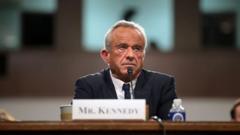**As Robert F. Kennedy Jr. undergoes confirmation hearings for the role of U.S. Health Secretary, senators confront him over his vaccine remarks, past abortion stance, and food industry criticisms, laying bare a polarized political landscape.**
**RFK Jr. Faces Tough Questions in First Confirmation Hearing as Health Secretary**

**RFK Jr. Faces Tough Questions in First Confirmation Hearing as Health Secretary**
**Robert F. Kennedy Jr.'s first day in front of Congress reveals stark divisions over past comments and commitments to health policy.**
Robert F. Kennedy Jr.'s first confirmation hearing for the position of U.S. Health Secretary opened with a mix of fierce questioning and impassioned support, reflecting the polarized political environment surrounding his nomination. Appointed by President Donald Trump, Kennedy, known for his skeptical views on vaccines, faced significant scrutiny regarding his past comments on COVID-19 vaccinations and health policies.
Senators from both sides of the aisle engaged Kennedy, who has led the Children's Health Defense group that has raised doubts about vaccine safety. Under pressure, Kennedy clarified that he is not anti-vaccine; rather, he advocates for more thorough testing and research regarding vaccines. However, his past rhetoric, including a statement from a recent podcast where he claimed, "There's no vaccine that is safe and effective," provoked significant concern. During the hearing, he maintained that controversial quotes had been taken out of context and reiterated his support for the existing childhood vaccination schedule.
Kennedy’s opening statements prominently featured his criticisms of processed foods, which he linked to rising obesity rates in the United States. He promised to scrutinize food industry practices and suggested removing financial conflicts in health institutions, seeking to reverse the country's chronic disease crisis. His remarks about processed food accessibility drew mixed reactions, particularly when he acknowledged that enjoying items like McDonald's cheeseburgers should remain a choice for consumers.
The topic of abortion arose during the session, where Kennedy, previously known for his pro-choice views, made remarks that seemingly aligned with Republican sentiments. He stated, "Every abortion is a tragedy," while agreeing with President Trump that regulations should be determined at the state level. This shift drew criticism from senators across the political spectrum, suggesting he may be compromising his previously held beliefs for political expedience.
Senator Bernie Sanders questioned Kennedy on the need for universal healthcare and the pharmaceutical industry’s pricing structures, reflecting a broader call for reform in healthcare access. Additionally, Sanders confronted Kennedy about merchandise, notably "unvaxxed" baby onesies sold by the organization he formerly led. Kennedy distanced himself from these products, stating his resignation from the organization, which did not satisfy all members of the committee.
As the hearing unfolded, Republican senators generally expressed support for Kennedy’s initiatives in health reform, while Democrats challenged his credibility and questioned his grasp of healthcare complexities. The political divide was exemplified by reactions from Senators Ron Johnson, who wished Kennedy success, compared to Senator Ron Wyden's scathing remarks about his qualifications.
Kennedy's first session ended, with a follow-up hearing set for Thursday, where he will continue to face questions from the Senate health committee. The outcome of these confirmation hearings is critical, as the committees will ultimately vote on his nomination before the full Senate considers his appointment to oversee vital public health policy.





















